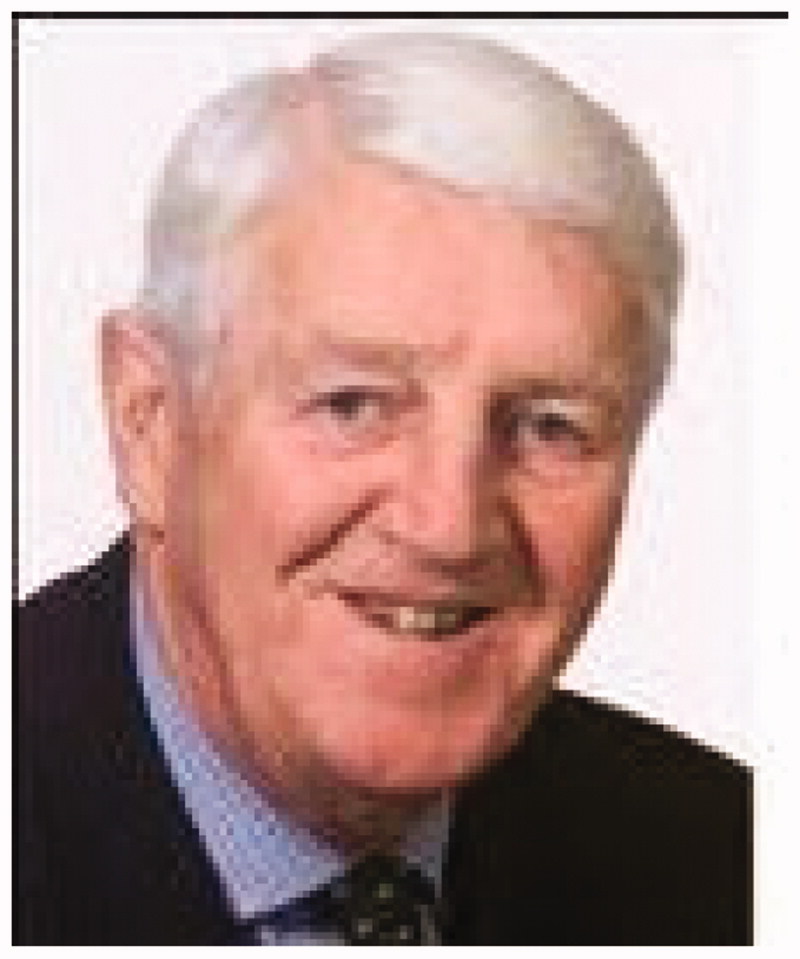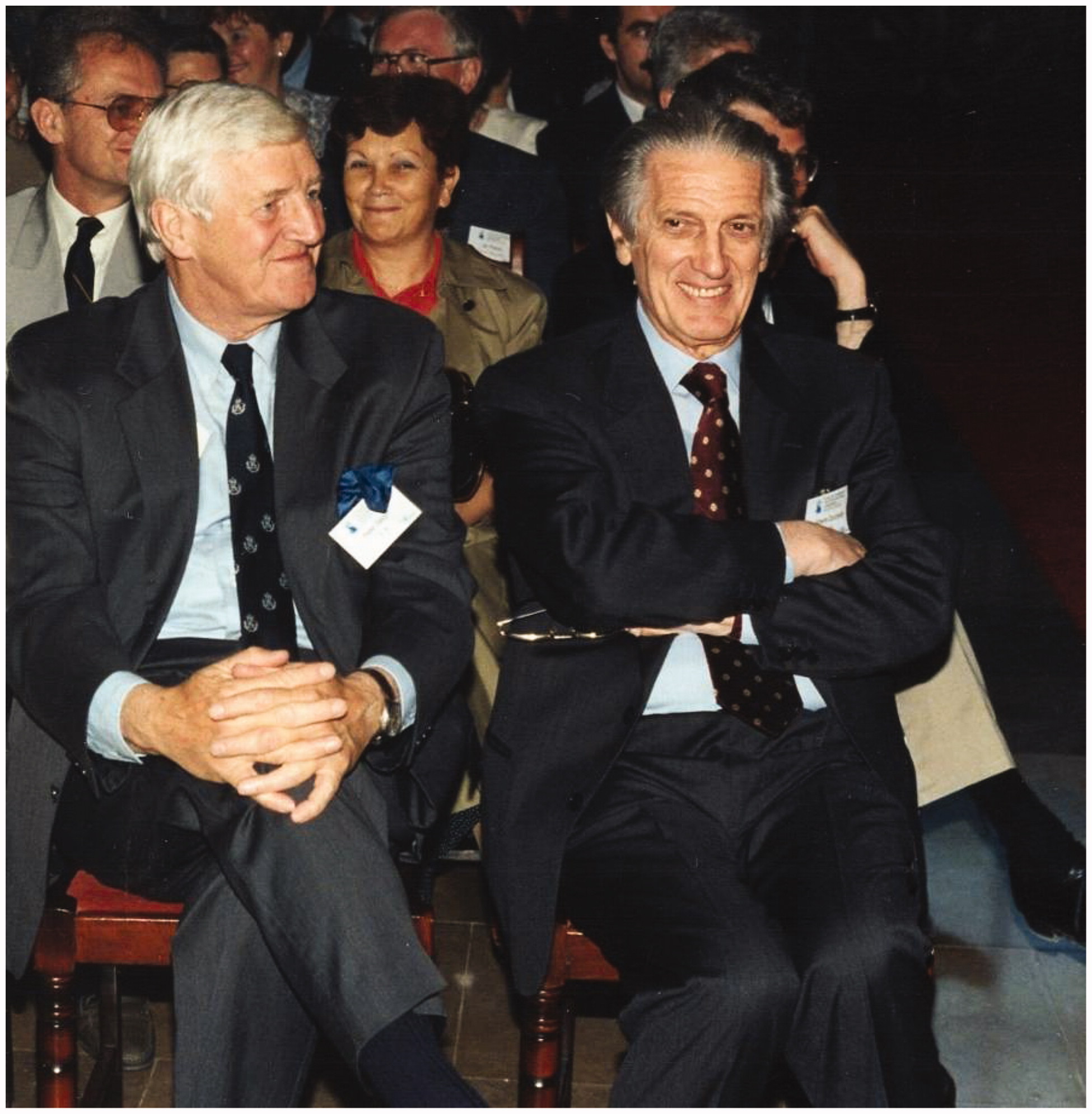
The sad news came to us of Peter Sleight’s passing on 7 October 2020. He suffered from a stroke few years ago and a note reached us from Christopher Sleight, Peter’s oldest son: ‘My sad news is that Peter died peacefully on Wednesday evening at The Old Prebendal House. This was somewhat expected but was sooner than I had anticipated – which given how things are these days is probably a blessing. The really sad part is that we haven’t been able to visit very often recently due to Covid-19 and when we have, it is with full PPE (personal protection equipment) and remaining socially distanced. We last saw Peter about two weeks ago, when he was very morose and barely said a word to us. I couldn’t even get him to talk about the US Open Golf. I think he had basically decided that he had had enough and shut down. I can’t help but think the isolation caused by Covid-19 is at least partly responsible’.
Professor Peter Sleight, MD, DM, FRCP, FACC was born on 27th June, 1929 in Boston Spa, Yorkshire, United Kingdom. He was a distinguished internationally known research cardiologist and an honorary consultant physician at the John Radcliffe Hospital in Oxford, part of the Oxford Radcliffe Hospital National Health System Trust. He served as consultant physician and cardiologist at the Radcliffe Infirmary in Oxford since 1964. Peter Sleight was the British Heart Foundation-sponsored Field Marshal Alexander Chair and Professor of Cardiovascular Medicine at the University of Oxford and a Fellow of Exeter College, Oxford. He retired in 1994, but continued to work at the John Radcliffe Hospital in Oxford. He travelled to numerous meetings and conferences around the world with Gillian, his wife, frequently by his side. In wintertime, they typically travelled with their cross-country skis checked in baggage. They were good at using them until recent years and advanced ages. Physicians in many countries enjoyed learning from him, and hearing the most updated medical truths in perfect Oxford English. The photo below shows Professor Peter Sleight and the late Professor Alberto Zanchetti [Citation1] during the opening ceremony of the symposium ‘Metabolic disturbances in arterial hypertension’ in Gdansk, Poland, in May 1995.
Anecdotally, it may be mentioned that during a winter course in the mountains between Oslo and Bergen around 1975, skiing was the only downhill transport between the lodge and the restaurant. Properly dressed in a black suit for dinner, Peter Sleight observed Professor Ivar Eide, a well trained mountain skier, who disappeared into the darkness towards the dinner. Sleight, on his cross-country skis, did not hesitate to follow him. Shortly after, hungry and with a broken leg, he was transported to Oslo and spent some days in the nephrology ward after his leg surgery.
Peter Sleight was a Fellow of the American College of Cardiology and an esteemed leader in the field of cardiology research. He served on the editorial boards of many high profile journals such as Cardiovascular Research, Cardiovascular Risk, Circulation, Hypertension, the British Heart Journal, Clinical & Experimental Physiology & Pharmacology, and the Journal of Ambulatory Monitoring. He authored peer reviewed articles on topics such as blood pressure monitoring and control, autonomic control of the circulation, prognostic value of heart rate variability, pathophysiology of ischaemic heart disease, heart failure and hypertension, in journals such as the Lancet, New England Journal of Medicine, Circulation, Heart, European Heart Journal, the British Medical Journal and Clinical Science.
Peter Sleight was a world-leading cardiovascular investigator. He co-authored over 500 papers that have been quoted in more than 40,000 original articles and hundreds of textbooks in the field of cardiovascular medicine. He was president of the World Hypertension League and served as chair of the International Study of Infarct Survival (ISIS) group and the related coronary prevention studies coordinated by the Clinical Trials Service Unit in Oxford. Sleight was educated at Leeds Grammar School and Gonville and Caius College where he studied medicine at Cambridge University and at St Bartholomew's Hospital Medical School.
In 1964, consultant cardiologist Peter Sleight in conjunction with cardiac surgeon Alf Gunning from South Africa performed one of the first pioneering operations to install an external Lucas cardiac pacemaker in a patient in her early 30s at the Radcliffe Infirmary in Oxford. This involved attaching circular coils in the patient's heart and matching them with coils aligned on the skin of the patient to transfer the electrical charge from the external cardiac pacemaker to the heart. The patient had previously spent many months connected to a filing cabinet size artificial heart machine known as the ‘fire engine’ because of its red colour [Citation2].
Sleight was the first to carry out studies of the effects of aspirin on cardiac function and stroke prevention in the early 1970s. He and his research team at Oxford also led the way and laid the foundation for research on the use of aspirin in the prevention of other forms of cardiovascular disease. As chair of the ISIS research team, he played a major role in several pioneering international trials of cardiovascular disease treatment, including the use of aspirin (ISIS-2) [Citation3], thrombolysis (ISIS 2 and 3) [Citation3,Citation4], angiotensin converting enzyme inhibitors (The Heart Outcomes Prevention Evaluation Study, HOPE) [Citation5] and statins (The Heart Protection Study, HPS) [Citation6]. He also served on data safety monitoring boards (DSMB) of numerous major clinical trials, including the Global Utilisation of Streptokinase and Tissue Plasminogen Activator for Occluded Coronary Arteries Study (GUSTO), The Estudios Clínicos Latino America (ECLA), the Anglo-Scandinavian Cardiac Outcomes Trial (ASCOT), the Effect of a fixed combination of perindopril and indapamide on macrovascular and microvascular outcomes in patients with type 2 diabetes trial (ADVANCE), the Examining Use of Ticagrelor in Peripheral Artery Disease Trial (EUCLID), the Mode Evaluation in Sick Sinus Syndrome Trial (MODEST), the Cardiovascular risk Reduction by Early Anaemia Treatment with Epoetin Beta Trial (CREATE), the Comparison of Fondaparinux and Enoxaparin in Acute Coronary Syndromes Trial (OASIS), the ClOpidogrel and Metoprolol in Myocardial Infarction Trial (COMMIT), the Valsartan Antihypertensive Long-term Use Evaluation Trial (VALUE), the Pacing, graded Activity, and Cognitive behaviour therapy; a randomised Evaluation Trial (PACE), the Sibutramine Cardiovascular and Diabetes Outcome Study (SCOUT), the Randomised Evaluation of Long-Term Anticoagulant Therapy Trial (RELY), the Outcome Reduction with an Initial Glargine Intervention trial (ORIGIN), the Effect of rosuvastatin in patients with chronic heart failure Trial (GISSI-HF), the Telmisartan Alone and in Combination with Ramipril Global Endpoint Trial (ONTARGET), the Telmisartan Randomised Assessment Study in ACE Intolerant Subjects with Cardiovascular Disease Trial (TRANSCEND) and the Prevention Regimen for Effectively Avoiding Second Strokes Trial (PRoFESS).
Service on a DSMB sometimes has the very highest impact in clinical trials research. Such was Sleight’s contribution in the VALUE trial [Citation7]. At the first interim analysis there were such large differences between study arms that an inexperienced DSMB easily could have voted to abort the trial. However, beyond the O’Brien-Fleming stopping rule, the trial was event driven and it ran until the predefined number of primary events was seen, showing non-inferiority between arms comparing the calcium channel blocker with the angiotensin receptor antagonist. We can only imagine how hypertension guidelines had looked like today if the experience of Peter Sleight and committee chair Professor Stephen MacMahon had not endured.
Sleight also received numerous scientific awards. These included the Young Investigator’s Award of the American College of Cardiology, the Evian Award for Medicine and Science, the International Society of Hypertension and Merck Sharp & Dome Award for Distinguished Research, the Galen Medal for Therapeutics of the Society of Apothecaries, the Mackenzie Medal of the British Cardiac Society, the Louis Bishop Lecturer Award of the American College of Cardiology, the Lifetime Research Award of the Russian Federation of Cardiology, and the Bayer International Aspirin Senior Award and the Alberto Zanchetti Lifetime Achievement Award of the European Society of Hypertension.
Peter Sleight was a mentor for a great many members of the major hypertension and cardiology societies. He will be remembered for being the key opinion leader of evidence-based medicine and for his major focus on engaging in lectures and discussions with younger doctors in training. The latter was particularly evident through his enthusiastic teaching and interactive exchange with students during the Summer and Winter Schools of the European Society of Hypertension, which he regularly attended. Sleight was always a regular Faculty member and was present from beginning to end. We all remember his lectures on how to critically assess scientific papers and on how to recognise (or at least smell) false or fabricated data, with several real life examples described with his usual extraordinary wit. Last but not least, Sleight had great powers of persuasion and extraordinary talent as a speaker. His scientific lectures were always peppered with a good pinch of British humour, which fascinated his young and old colleagues alike.
Disclosure statement
RK is President of the European Society of Hypertension, SEK, KN, MB and SO are Editors of Blood Pressure, and GM is Editor of Journal of Hypertension. None reports conflicts of interest related to this obituary.
Acknowledgment
The authors thank Dr. Alastair Webb for reviewing Ms. and improving details regarding organization of the health service in Oxford.
References
- Kjeldsen SE, Narkiewicz K, Burnier M, et al. In memoriam: Alberto Zanchetti. Blood Press. 2018;27(3):123–124.
- Record CO, Sleight P, Gunning AJ, et al. Treatment of chronic heart block with the Lucas induction coil pacemaker. Br Heart J. 1971;33(6):938–942.
- ISIS-2 (Second International Study of Infarct Survival) Collaborative Group. Randomised trial of intravenous streptokinase, oral aspirin, both, or neither among 17,187 cases of suspected acute myocardial infarction: ISIS-2. Lancet. 1988;332:349–360.
- ISIS-3 (Third International Study of Infarct Survival) Collaborative Group. ISIS-3: a randomised comparison of streptokinase vs tissue plasminogen activator vs anistreplase and of aspirin plus heparin vs aspirin alone among 41,299 cases of suspected acute myocardial infarction. Lancet. 1992;339:753–770.
- Sleight P. The HOPE study (heart outcomes prevention evaluation). J Renin Angiotensin Aldosterone Syst. 2000;1(1):18–20.
- Collins R, Armitage J, Parish S, et al. MRC/BHF Heart Protection Study of cholesterol-lowering with simvastatin in 5963 people with diabetes: a randomised placebo-controlled trial. Lancet. 2003;361:2005–2016.
- Julius S, Kjeldsen SE, Weber MA, et al. Outcomes in hypertensive patients at high cardiovascular risk treated with regimens based on valsartan or amlodipine: the VALUE randomised trial. Lancet. 2004;363(9426):2022–2031.
